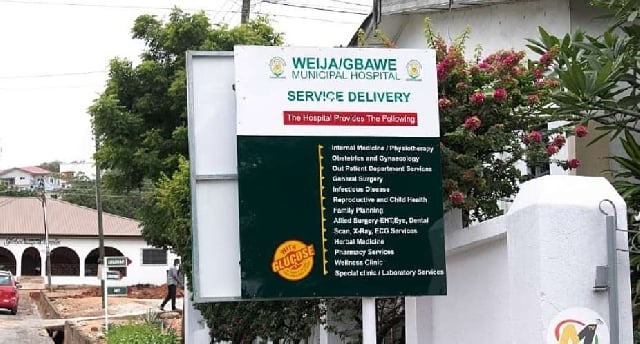The Weija Gbawe Municipal Hospital, located in McCarthy Hill within the Greater Accra Region of Ghana, is facing a severe crisis stemming from a critical shortage of beds. This dire situation is leaving numerous patients, many in urgent need of medical attention, without access to necessary care. The hospital, designed to serve as a vital healthcare provider for the surrounding community, is struggling to cope with an overwhelming influx of patients, forcing many to endure protracted waiting periods before they can be admitted. This bottleneck in patient intake creates a cascading effect, delaying treatment and potentially exacerbating medical conditions. The lack of available beds not only compromises patient care but also places an undue burden on the existing medical staff, further straining the already limited resources of the facility.
Beyond the immediate concern of bed scarcity, troubling reports have emerged alleging neglectful practices by some members of the hospital’s medical staff. Patients have described instances of being left unattended for extended durations, adding another layer of distress to their already challenging circumstances. Such allegations, if substantiated, raise serious questions about the quality of care being provided and the overall commitment to patient well-being within the institution. The combination of bed shortages and alleged neglect paints a grim picture of a healthcare system under immense pressure and failing to meet the fundamental needs of the community it serves.
The deteriorating conditions at Weija Gbawe Municipal Hospital have understandably ignited widespread concern among residents about the overall accessibility and quality of healthcare in the area. The hospital’s struggles are not isolated incidents but rather symptomatic of broader systemic challenges within Ghana’s healthcare system. These challenges include inadequate infrastructure, chronic understaffing, and insufficient resource allocation, all of which contribute to the compromised quality of care. The community’s anxieties are amplified by the realization that their access to timely and effective medical intervention is severely limited, leaving them vulnerable in times of illness or injury. This growing crisis demands immediate and decisive action to address the underlying issues and prevent further deterioration of the healthcare landscape.
The public outcry over the situation at Weija Gbawe has led to increasing calls for immediate intervention to address the pressing needs of the hospital and the community it serves. These calls emphasize the necessity for significant improvements in the hospital’s infrastructure, particularly the provision of more beds to accommodate the patient load. Equally crucial is the need for increased staffing to alleviate the burden on existing medical personnel and ensure that patients receive adequate attention and care. Addressing the staffing shortage requires not only recruitment but also strategies for retention, including competitive compensation and supportive working conditions to attract and retain qualified healthcare professionals.
The chronic bed shortage at Weija Gbawe Municipal Hospital highlights a critical vulnerability within the Ghanaian healthcare system—a lack of surge capacity. This refers to the ability of a healthcare facility to expand its operations and resources rapidly in response to a sudden increase in demand, such as during a disease outbreak, natural disaster, or, as in this case, a sustained influx of patients. The absence of surge capacity leaves hospitals like Weija Gbawe ill-equipped to handle unexpected patient volumes, leading to overcrowding, compromised care, and ultimately, preventable suffering. Investing in surge capacity is an essential component of strengthening the overall resilience of the healthcare system.
The crisis unfolding at Weija Gbawe Municipal Hospital serves as a stark reminder of the urgent need for comprehensive reform and increased investment in Ghana’s healthcare system. This necessitates a multi-pronged approach that encompasses not only infrastructural development and increased staffing but also improvements in hospital management practices, greater accountability within the healthcare sector, and a renewed commitment to prioritizing patient well-being. Ultimately, ensuring that all citizens have access to quality healthcare requires a sustained and concerted effort from government, healthcare professionals, and the community at large. The situation at Weija Gbawe is a call to action, demanding that concrete steps be taken to address the immediate crisis and implement long-term solutions to strengthen the healthcare system for the benefit of all Ghanaians.














